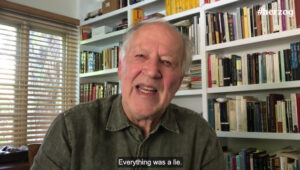
A still from the Q&A after Herzog’s latest feature film.
Director Werner Herzog’s latest feature film is now available, which always gives me cause for relief and surprise. In a world of Netflix fast-food, a Herzog film is a bowl of Bavarian leberknödelsuppe—something interesting and nourishing, with a complicated whiff of blood-rich organs.
Herzog, now in late career with some 70 long and short films, is known for a wide variety of subjects, many focused on themes such as obsession/madness (Aguirre, the Wrath of God; Fitzcarraldo; and Grizzly Man), and consciousness/“the modern human soul” (Cave of Forgotten Dreams; Lo and Behold, Reveries of the Connected World).
One unifying element in his work is the (con)fusion of fiction and nonfiction in our lives and in his filmmaking. His newest, Family Romance, LLC, uses several layers of that to make its meaning. The film premiered at Cannes in 2019 and is now available on MUBI.
Family Romance is set in Japan and is in Japanese with English subtitles. The main character is a handsome young man named Yuichi Ishii (the actor’s real name), who runs a business called Family Romance (as he does in life). Family Romance (in the film and in life) provides consumers with family and friends they do not otherwise have or like. If dad is an alcoholic and cannot be trusted to be present at his daughter’s wedding, mom might hire an actor to replace him at the ceremony. If an elder is lonely, she can hire a fake grandchild to visit and listen. Actors attend events with women, serve as butlers or professional scolds, and pretend to be someone’s friend.
In the film, Ishii is hired by a divorced mother to pretend to be her daughter’s father, who left when the girl was only two. The girl, Mahiro (played by Mahiro Tanimoto), is not told that Ishii is not her real father, though the film hints that she might know and is performing her own lie to see what happens.
What happens is that Ishii is such a kindly and good influence on the girl that she—and her mother—come to love him. Mom invites him into the family for real, which creates the film’s main dilemma, beyond the background problem of widespread loneliness. (In real life, Ishii has sometimes been stalked by clients and has had hundreds of offers of marriage.)
Critics have deemed the film one of Herzog’s “minor” efforts, but its playfulness with the notion of “truth,” its questioning of what authenticity means in human relationships, its quietude and seemingly conventional storytelling, despite being a guerrilla film, make it very moving at times and always interesting.
In the Q&A that follows the film on MUBI, the host tells Herzog that “hiring actors who are playing actors, who then act themselves inside another drama in the film—this is an incredibly surreal, layered work of artifice and behavior.”
Herzog says that he is after a “fundamental question of human existence. What is a lie? What is truth? Everything in the film is, in a way, a lie or performative…. Everything is not true. And yet it has a truth in it, strangely enough.”
He sees what is fake “as a benign element for human survival,” in part because it reduces loneliness. This might include paid relationships, which he views as a growth industry, or even robotics, which play a role in Family Romance.
Herzog is gleeful that critics did not know, at first, if the film is fiction or a documentary. He is even prouder when he points out that in 1980 he was saying, “The 21st century will be a century of solitudes.”
